
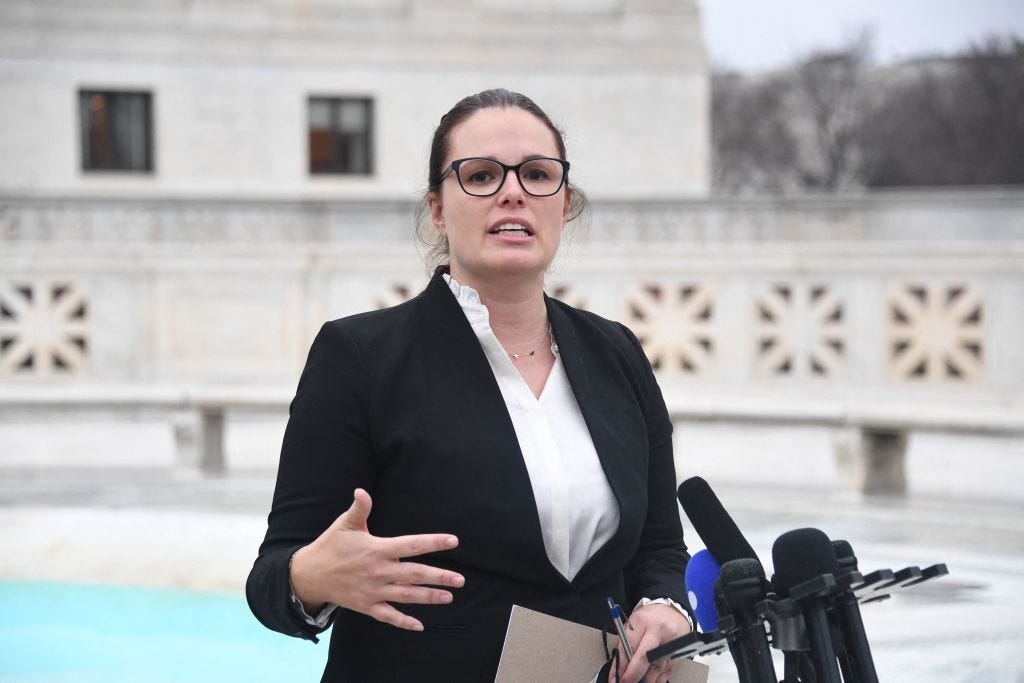
In November, Allison Riggs (D) won election to the North Carolina Supreme Court. The race was extremely close. The initial count had Riggs ahead of her opponent Jefferson Griffin (R) by 623 votes out of the 5.5 million votes cast. Because of the small margin, Griffin requested a machine recount of all ballots cast, which put Riggs ahead with a lead of 734 votes. Griffin then requested a second partial hand recount, which saw Riggs’ lead increase by another 14 votes.
But even after multiple recounts, Griffin still refused to concede. Republicans have now spent over five months attempting to overthrow the election, claiming that Riggs only won because of votes cast by ineligible voters. President Donald Trump did not contest the 2024 election because he won. But Republicans have adopted Trump’s playbook of attributing any loss to election fraud.
Since the recounts, Griffin has been attempting to get over 60,000 ballots thrown out, claiming that many of them are invalid. Most of the challenges are to ballots cast by voters whose registration form did not include a driver’s license or Social Security number. Griffin is also challenging the eligibility of military voters and voters who live overseas.
Griffin originally filed legal challenges against the 60,000 ballots with the State Board of Elections. The Board, which has a Democratic majority, rejected Griffin’s claims. In February, a trial court also rejected Griffin’s case. Griffin then appealed the ruling. On Friday, a panel of the North Carolina Court of Appeals ruled in Griffin’s favor, deciding that the 60,000 ballots must be recounted and verified.
The ruling states that all 60,000 people must be notified and given 15 business days to provide proof of identity, or their vote will be thrown out. The court also ruled to throw out ballots cast by North Carolina voters abroad who have never lived in the state, despite a state law passed in 2011 that gives them the right to vote. These voters often include children of military members stationed abroad or missionaries, the New York Times reported.
Griffin is attempting to disenfranchise tens of thousands of people without showing that any of these voters are ineligible. “[T]he Court of Appeals’ ruling is destined to disenfranchise thousands of North Carolinians, denying them due process and equal protection under North Carolina law,” Riggs’ lawyers wrote in a filing seeking a stay in the decision.
The case will now be appealed to the North Carolina Supreme Court, where Riggs should already be months into her first full term. Without Riggs, who will recuse herself, Republicans hold a 5-1 majority on the court. On Monday, the state Supreme Court temporarily stayed the Court of Appeals’ ruling to consider Riggs' appeal.
Changing the rules after the game is over
There are several legal issues with Griffin’s argument. One major problem is that if Republicans thought the registration process was legally flawed, it should have been challenged before the election.
Before the November election, a similar effort to remove voters’ eligibility was rejected by a federal judge appointed by Trump. Nevertheless, Griffin is recycling the same arguments after the election in an attempt to overturn the results.
This violates a federal election doctrine known as the Purcell principle, which states that courts should not alter the rules of the election directly before, during, or after an election. Court of Appeals Judge Toby Hampson (D) quoted Purcell v. Gonzalez in his dissent Friday. “The Purcell principle and other equitable principles demand we do not change the rules of an election midstream or after votes are tallied to disenfranchise qualified North Carolina voters,” Hampson wrote.
Sending voters a QR code before disenfranchising them
Another issue is that the voters Griffin is attempting to disenfranchise were not properly notified about how their ballots were being challenged. Instead, voters received a postcard from the North Carolina Republican Party instructing them to scan a QR code for additional information.
Popular Information obtained a photo of one postcard.
Hampson wrote in his dissent that it is not certain that these postcards successfully notified the affected voters. “The postcards do not identify a protestor or campaign committee, do not provide for forwarding, and, ultimately, provide no indication a quasi-judicial election protest has, in fact, been instituted involving the recipient,” Hampson wrote. “Forcing voters to have the technological means, ability, or trust to not only scan a QR code—sent anonymously through the mail—but to then be directed to a partisan website in order to sift through dozens of challenges and thousands of names, which were not even listed in alphabetical order, cannot be said to be reasonably calculated or certain to inform those affected voters.”
We started a new publication, Musk Watch. NPR covered our launch HERE. It features accountability journalism focused on one of the most powerful humans in history. It is free to sign up, so we hope you’ll give it a try and let us know what you think.
Disenfranchising eligible voters
Most of the votes Griffin is challenging are being called into question because the voter registration does not include a driver's license or Social Security number, which has been included on North Carolina voter registrations since 2002. But, as the dissenting opinion issued by the North Carolina appeals court points out, a voter registration lacking a driver's license or Social Security number does not mean that the voter did not provide one.
In North Carolina, if a county elections board cannot validate a driver’s license or Social Security number — which can occur if a clerk enters the number incorrectly, or if there is a discrepancy between maiden and married last names or hyphenated last names — then the number provided by the voter will not be saved as a part of the voter registration.
None of the voters were told there was anything missing from their voter registration form. They received confirmation that they were registered to vote and were provided a ballot. Further, Hampson pointed out several cases where North Carolina courts had previously ruled that ensuring complete and accurate voter registration was the responsibility of county election boards and that voters could not be disenfranchised due to errors by the board.
Riggs has also argued that throwing out ballots solely because of a missing driver’s license or Social Security number is a violation of the Civil Rights Act of 1964, which states that public officials cannot “deny the right of any individual to vote in any election because of an error or omission on any record or paper relating to any application, registration, or other act requisite to voting, if such error or omission is not material in determining whether such individual is qualified under State law to vote in such election.”
Throwing out military votes
Griffin is making another argument that military and overseas voters who did not provide photo identification should have their votes thrown out. According to Griffin, ballots cast by overseas voters are subject to the state's laws on other kinds of absentee ballots, requiring photo identification. But overseas ballots are subject to a different provision of North Carolina law that does not require a photo ID.
Since 2023, the State Elections Board, which is given authority by North Carolina law to provide instructions to overseas voters on how to cast their ballots, has implemented a rule that overseas voters would not need to provide photo identification. Before this election, Griffin did not take issue with this rule.



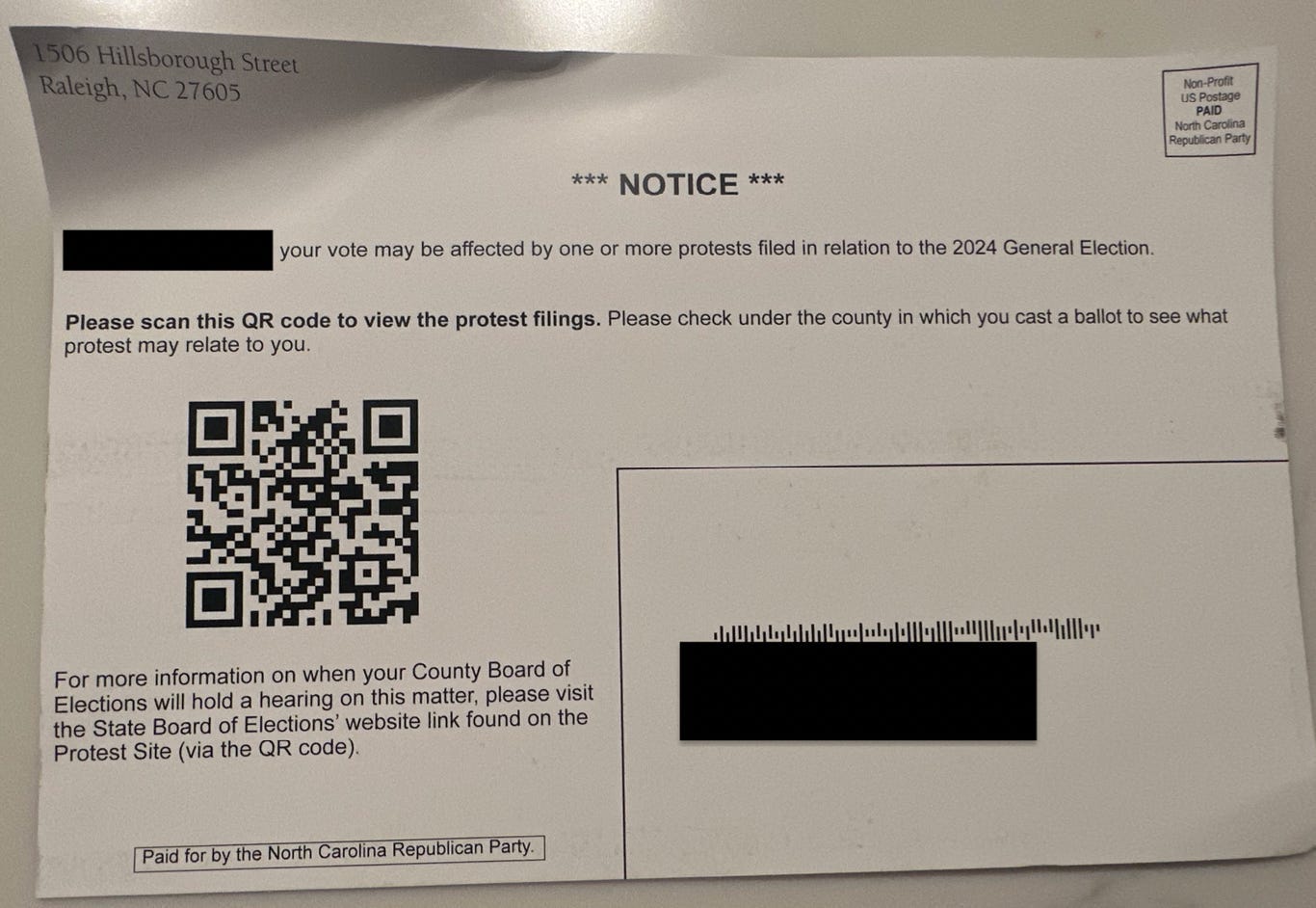





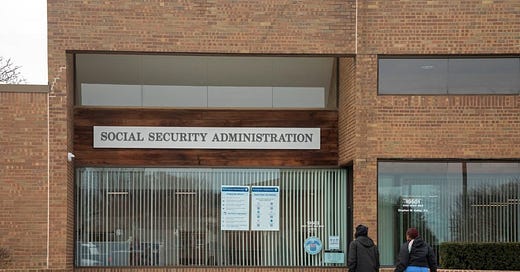


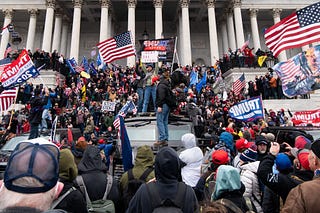
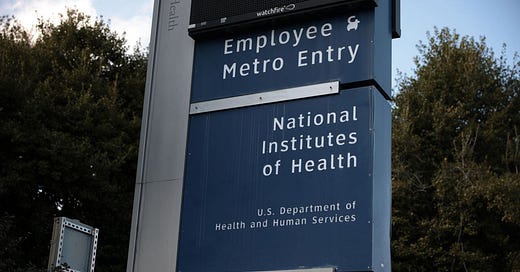

Violating the Purcell Principle--whereby courts cannot weigh in on election law immediately before, after or during an election should be reason enough for NC's courts to throw out this GOP attempt to disqualify the votes of tens of thousands of citizens. But honesty and honor are no longer part of the Republican brand, who will lie, cheat and steal to gain power. All so that they can give tax cuts to billionaires. Disgusting.
Thank you Rebecca and Noel for your thorough examination of the North Carolina Supreme Court seat won by Allison Riggs and Jefferson Griffin's attempted heist. We appreciate that you are fighting for the rights of women, especially when they have proven over and over that they deserve the post they have won.